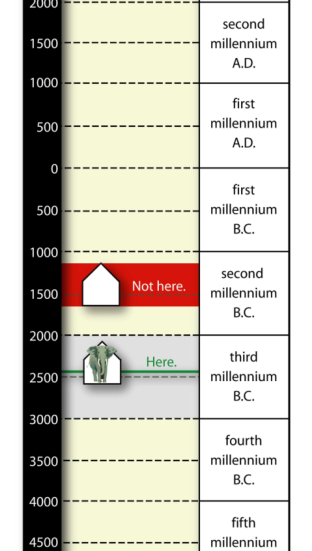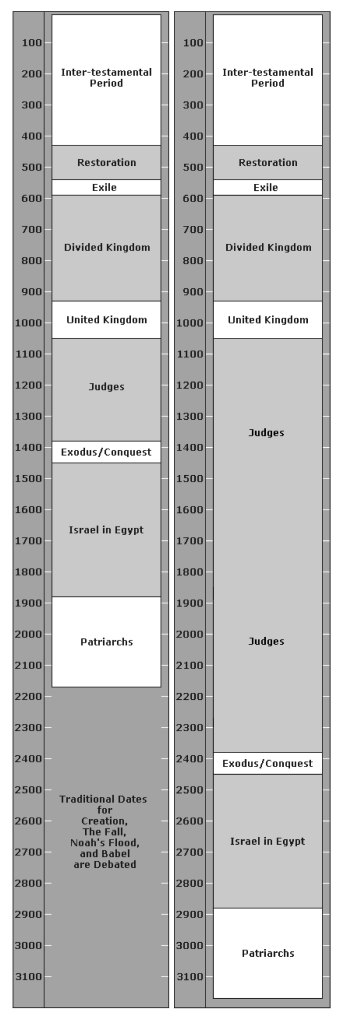Growing up in a Christian home, and attending church every Sunday, I clearly remember hearing the stories from the Bible over and over again. Like so many other people, those accounts from the Bible, and the lessons behind the stories, are certainly part of what shaped me into the follower of Christ that I am today.

A problem with some of those stories.
As a child in Sunday School, I took it for granted that the stories being told to me were true stories. They were coming from the Bible, so of course they were true. Like many Christians, this has been my way of thinking for pretty much all of my life. The accounts found in the Bible are taken to be true accounts, simply because they are from the Bible, God’s Word. They are simply trusted and believed by faith.
Until it was brought to my attention some years ago, I had no idea that there was a problem. A serious problem. Now, this article is going to give some really good news concerning the stories from the Bible (good news, that is, if you are a Bible-believing Christian who loves God’s Word, as I do). But before we get to that good news, many need to wake up to the bad news, and the serious beating that Christianity has taken over a good portion of the last century.
We all know true stories happen in real-world history. This is what separates Cinderella from Queen Elizabeth. If evidence for an account cannot be found in the real world during the time and at the place it was supposed to have happened, it cannot be viewed as a true story, no matter how much a person wants to believe it. We take God at His word by faith, but Christianity is not a blind faith. This is what separates Christianity from cults. We hold to what is true– God’s Word found in God’s real world– not some far-fetched accounts we are just told to blindly believe, or else. Don’t forget, the Mormons follow a man who said he found golden plates in the woods, from which he translated the Book of Mormon, but nobody was ever allowed to see the golden plates, and nobody has seen them to this day. In contrast, Christians must be all about the real world. We absolutely must be. Our eyes must be wide open, and we must engage all our faculties in our pursuit of God and His truth. He is the true and the living God, after all.
But here is one big problem Christianity has been up against for the good part of a century now. If you were to conduct a search on the evidence of early Old Testament Bible accounts being found within the historical record and within modern archaeological finds, it would not take you long to realize that there are serious issues with the historical reliability of those Bible accounts. Without getting into all of the details here, simply put, and being completely honest, these accounts have been strikingly missing from real-world history.
While this is general knowledge for some, I believe many Christians today would be completely shocked by this fact. I surely was when I first began to realize this. I had always believed the stories from the Bible by faith, but it had never even occurred to me that some of the accounts could not be found in history. And if it had been brought up to me in the past, my instinctive reaction would have been to blast the heathen atheists for their utter rejection of the obvious truth. So it certainly was a shock the day I realized that this utter lack of evidence was, indeed, a reality.
In my case, this realization came in the context of also seeing the answer to the problem, which I will point to in this article in just a moment. But many have sadly come to this knowledge without any real answers, and this can be a frightful place to land. I hope and pray that the information shared here, and in articles to come, will help the faith of these people to be strengthened, and bring others to the realization that Christianity is based on solid evidence in the real world.
So let’s briefly get into some of the details.
An odd phenomenon.
Now, there is an odd phenomenon concerning these Bible accounts and individuals that we cannot find in the historical record. From about the time of Samuel forward, we have plenty of real-world evidence to demonstrate the validity of these biblical accounts. We find that archaeology and extra-biblical sources have no problem corroborating the existence of biblical historical people.
However, as soon as we move on back beyond Samuel, things suddenly get bad. We simply cannot match up even one biblical person with any secular historical writing much before the monarchy in Israel. And it’s not like we haven’t tried. We have been searching in every corner and under every cushion for what ought to be the elephant in the room, coming up empty every time.
The question of course is, why? Why is it that we have archaeological confirmation of biblical individuals every 20 years on average in the first half of the first millennium B.C., and yet we cannot find even one such confirmation in a thousand years prior to this? Why can we confirm men such as Solomon, Ahab, Hezekiah, and Nebuchadnezzar, but cannot find men such as Joseph, Moses and Joshua? And it’s not just people we are looking for. We are looking for major events. Events that shaped the nation of Israel in its founding days. Events that show God at work in powerful and astounding ways. But they are simply not there.
This really is a problem, and it really is an odd one. Even minor biblical events can be found in extra-biblical sources within the first millennium B.C., yet it seems impossible to find support for the most major events of the millennium before it. Where are the walls of Jericho that fell before Joshua? (There’s not even a city, let alone any walls to fall.) Where is the battle of Ai that is described within the pages of Scripture? Where is the evidence for the most important event in the Old Testament, the Exodus of the nation of Israel from their captivity in Egypt, the wandering of millions of people in the wilderness, and their triumphant victories within the Promised Land? According to the devastation and details given in the biblical account, this should not be a difficult event to identify. Not to mention the Flood… but I will save that for another article.
Something is clearly wrong, and the problem is widely recognized. The majority of scholars today have concluded that the Bible is simply not historically reliable before the time of the United Kingdom of Israel. The earlier accounts given in the Bible are regarded as fables, bearing little resemblance to real history. If the Bible is a true account of real-world history, why do archaeology and the Bible not agree prior to the United Kingdom period? Many have been asking this question for quite a while now.
The skeptics and scoffers love to point all this out, of course. But the problem is, the skeptics have a point. Lots of points actually. And Christianity has been on the defensive for far too long. We aren’t going to be able to make any headway by telling unbelievers to just believe the Bible by faith. We need to be able to get on the offensive, and have the facts to show. We must have real-world evidence to demonstrate that our faith is not based on fairy tales.
There is actually a clear answer to this problem, and it is concerning the accepted biblical chronology. But it’s one of those answers that, while initially hard to find (and accept), once you have seen it, it becomes so obvious that you wonder how it has been missed all of these years. And it is initially hard to find because it is such a large leap outside of the box of what has been traditionally accepted in Bible chronology. However, once you step out of that box and look again, the elephant you were looking for is right there in front of you. You were simply in the wrong room.

A major proposition.
So, without further ado, here is the “simple” answer. Traditional biblical chronology is off by an entire millennium. Yep, that’s it. I repeat, TRADITIONAL BIBLICAL CHRONOLOGY IN THE OLD TESTAMENT BEFORE THE UNITED KINGDOM OF ISRAEL IS OFF BY AN ENTIRE MILLENNIUM. I don’t mean to yell, but this needs to be shouted from the rooftops.
There is a verse in the OT that is key in determining Old Testament chronology, such as the date of the Exodus– 1 Kings 6:1. This verse reads, “And it came to pass in the four hundred and eightieth year after the children of Israel were come out of the land of Egypt, in the fourth year of Solomon’s reign over Israel…” Solomon’s reign is usually placed at beginning around 970 B.C., placing the Exodus then around 1450 B.C. However, as already noted, the archaeology of Egypt and Canaan at this time is incompatible with the biblical record. (We will get into more details concerning this in future posts.) But there is another issue. If you add up the dates yourself, the Bible lists consecutive events between the Exodus and Solomon’s reign which total over 600 years, not 480.
In 1990, biblical chronologist and physicist, Dr. Gerald Aardsma, proposed a major adjustment to traditional biblical chronology. He proposed that the “480” of 1 Kings 6:1 was originally “1,480” in the original manuscripts, but the Hebrew letters corresponding to the “one thousand” were lost at an early stage of copying.
With this single chronological adjustment, the new biblical date for the Exodus becomes ca. 2450 B.C., and other biblical events are similarly shifted to earlier times, by exactly 1000 years relative to traditional biblical chronology.

The obvious test.
This change is obviously radical, and at first unthinkable. But here is an easy way to begin to test this theory. You obviously cannot insert a millennium–a full 1000 years– into history just willy nilly and expect it to work out for you. Obviously this would mess the timeline up in a really big way. That is, unless it really was missing. The absolutely unimaginable claim of this proposition ought to give some who are thinking clearly a reason to pause. The claim is that inserting a full millennium into Old Testament biblical chronology from the time of Samuel and the United Kingdom on backwards, lines up the accounts given to us in Scripture with the historical record and archeological finds. This claim does not result in making just one single event look to be true in history. This corrected chronology overwhelmingly brings harmony between biblical and secular accounts. And the evidence continues to mount.
I plan to post future articles here outlining some of the ways in which this corrected chronology “works.” I hope you will stay tuned.
Simply stated, as hard as it may be to believe, the conflict between secular and biblical histories in the Old Testament has been resolved. Dr. Aardsma’s research has also led to other exciting discoveries which we will discuss in future posts as well.
Conservative, Bible-believing Christians now have an answer for those who claim that the Old Testament stories are mere fabrications. Yes, the Bible stories are true, and the evidence has been sitting right there for all of these years. We have just been in the wrong “room,” looking at the wrong dates. Our goal is to broadcast this news far and wide, the Lord helping us to make this vital information known.
If you would like to read more information on the “missing millennium,” you can head over to Dr. Aardsma’s research website and download a free copy of his short book, A New Approach to the Chronology of Biblical History from Abraham to Samuel.
This changes everything.
|
|
Thank you for Signing Up |






I’ve been needing this! I too believe the Bible to be the revealed word of God
Awesome! We are very excited to be able to share this information, and want to encourage sharing this with others and help to spread the word.